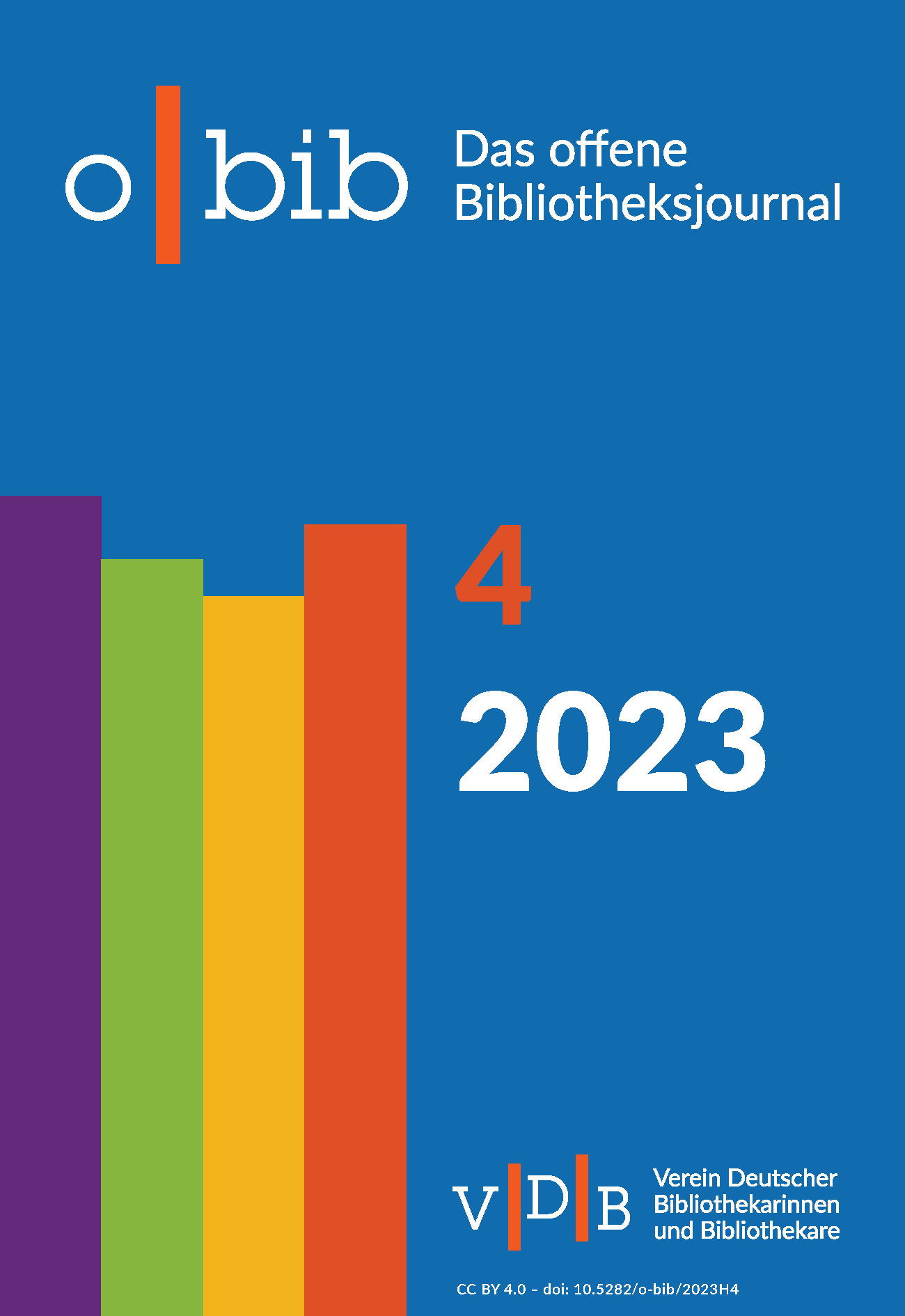Die Recherche nach Pseudonymen in deutschen Katalogen nach dem RDA-Umstieg
Bestandsaufnahme und Verbesserungspotenzial
DOI:
https://doi.org/10.5282/o-bib/5985Keywords:
Resource Description and Access (RDA), Cataloguing, Pseudonyms, RetrievalAbstract
Works written under pseudonym are treated differently according to RDA than according to RAK: If there are several bibliographic identities, not only must the authority records be split after the changeover to the new rules, but also some of the title records must be reassigned. This avoids problems in retrieval, but means considerable effort. A survey was conducted to determine the current situation with pseudonyms and how bad the consequences for the retrieval are considered to be. It became clear that a comprehensive intellectual processing of the pseudonym cases in the legacy data is unrealistic. In addition, a technical search solution which had originally been discussed has only rarely been implemented. Therefore, a machine assignment of title records to authority records would be an attractive alternative. A test showed that even with a relatively simple Python script, a large number of cases can be solved. With some extensions and optimally the inclusion of work clusters, a very reliable machine solution could be implemented
References
GND-Erfassungshilfe „Pseudonyme“ (EH-P06), https://wiki.dnb.de/download/attachments/90411361/EH-P-06.pdf, Stand: 30.07.2023.
Grund, Stefan; Vorndran, Angela: Personen in GND und Titeldaten. Vorschläge, Anreicherungen und Verknüpfungen, Folienpräsentation vom KIM-Workshop, 09.05.2023, https://wiki.dnb.de/download/attachments/266466762/2023_05_09_Vorndran_Angela_Grund_Stefan_PersonenInGNDundTiteldaten.pdf, Stand: 18.09.2023.
Pfeffer, Magnus: Using clustering across union catalogues to enrich entries with indexing information, in: Spiliopoulou, Myra; Schmidt-Thieme, Lars; Janning, Ruth (Hg.): Data analysis, machine learning and knowledge discovery. Proceedings of the 36th Annual Conference of the Gesellschaft für Klassifkation e.V. in Hildesheim, Germany. Berlin; Heidelberg 2013, S. 437−445.
Regeln für die alphabetische Katalogisierung in wissenschaftlichen Bibliotheken (RAK-WB), Stand: April 2006, Leipzig 20072. Online: https://nbn-resolving.org/urn:nbn:de:101-2007072711.
Schilling, Clara: Die Konsequenzen des RDA-Umstiegs für die Recherche nach Pseudonymen – aktuelle Situation, Probleme, Lösungsansätze, Bachelorarbeit, Hochschule der Medien, Stuttgart 2022. Online: https://nbn-resolving.org/urn:nbn:de:bsz:900-opus4-67622.
Vorndran, Angela: Hervorholen, was in unseren Daten steckt! Mehrwerte durch Analysen großer Bibliotheksdatenbestände, in: o-bib 5 (4), 2018, S. 166−180. Online: https://doi.org/10.5282/o-bib/2018H4S166-180.
Vorndran, Angela; Grund, Stefan: Metadata sharing. How to transfer metadata information among work cluster members, in: Cataloging & classification quarterly 59 (8), 2021, S. 757−774. Online: https://doi.org/10.1080/01639374.2021.1989101.
Wiesenmüller, Heidrun: Der RDA-Umstieg in Deutschland – Herausforderungen für das Metadatenmanagement, in: o-bib 2 (2), 2015, S. 43−60. Online: https://doi.org/10.5282/o-bib/2015H2S43-60.
Wiesenmüller, Heidrun; Horny, Silke: Basiswissen RDA. Eine Einführung für deutschsprachige Anwender, 2. Auflage, Berlin; Boston 2017.
Wiesenmüller, Heidrun; Pfeffer, Magnus: Abgleichen, anreichern, verknüpfen. Das Clustering-Verfahren – eine neue Möglichkeit für die Analyse und Verbesserung von Katalogdaten, in: BuB, 65 (9), 2013, S. 625−629. Online: https://b-u-b.de/fileadmin/archiv/imports/pdf_files/2013/bub_2013_09_625_629.pdf, Stand: 30.07.2023.
Downloads
Published
Issue
Section
License
Copyright (c) 2023 Clara Schilling, Heidrun Wiesenmüller

This work is licensed under a Creative Commons Attribution 4.0 International License.





